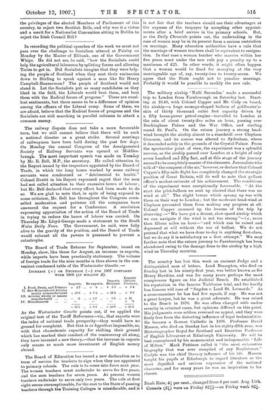The military airship Nulli Secundus ' made a successful trip
to London from Farnborough on Saturday last. Start- ing at 10.40, with Colonel Capper and Mr. Cody on board, the airship—a huge sausage-shaped balloon of goldbeater's- skin of thirty thousand cubic feet capacity driven by a fifty horse-power petrol-engine—travelled to London at the rate of about twenty-five miles an hour, passing over Buckingham Palace and the War Office, and circling round St. Paul's. On the return journey a strong head- wind brought the airship almost to a standstill over Clapham Common, and its course was altered to Sydenham, where it descended safely ill the grounds of the Crystal Palace. From the spectacular point of view, the experiment was a splendid success, as the airship passed over London at a height of only seven hundred and fifty feet, and at this stage of the journey seemed to be completely master of the elements. Journalists who talk of "the conquest of the air," however, or declare that Colonel Capper's fifty-mile flight has completely changed the strategic position of Great Britain, will do well to note that gallant officer's modest estimate of his achievement. The conditions of the experiment were exceptionally favourable. " At the start the pilot-balloon we sent up showed that there was no wind at all." The slight breeze which sprang up was with them on their way to London ; but the moderate head-wind at Clapham prevented them from making any progress at all. Colonel Capper summed up the lessons of the trip by observing :—" We have got a decent, slow-speed airship which we can navigate if the wind is not too strong "—i.e., more than fifteen miles an hour—" and which can be raised and depressed at will without the use of ballast. We do not pretend that what we have done to-day is anything first-class, but we do say it is satisfactory as a first attempt." We may further note that the return journey to Farnborough has been abandoned owing to the damage done to the airship by a high wind on Thursday morning.










































 Previous page
Previous page